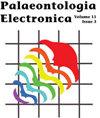已灭绝螯虾属Oncopareia Bosquet, 1854的分类修正(十足目,虾亚纲,虾科)
IF 1.5
4区 地球科学
Q1 Earth and Planetary Sciences
引用次数: 1
摘要
Oncopareia Bosquet, 1854年,是一个已经灭绝的有爪龙虾属,属于十足甲壳类动物的分支,其特征是在pleon上有短的方形胸膜,主爪具有球根状掌和针状齿。事实上,Oncopareia是迄今为止已知的最早的胸鳍龙虾,最古老的例子是Turonian时代(~90 Ma)。最初,Oncopareia是为一个来自荷兰东南部的马斯特里赫特晚期物种O. bredai Bosquet(1854年)而建立的。该属的分类学历史错综复杂,始于一个模式种,它是两种在属水平上不同的龙虾的偶然组合,第二个属是Hoploparia M 'Coy, 1849年。类似的情况也发生在弗里奇和卡夫卡1887年所著的《双叶飞虱》(Hoploparia bisserialis Fritsch)中,对其的描述部分基于可归因于Oncopareia的材料。一些后来建立的分类群被分配到Oncopareia,仅仅基于孤立的趾状指,后来才被认为是鬼虾属Ctenocheles Kishinouye, 1926。这是由于在几个不同的十足动物谱系中,果尖爪的进化趋同。本文总结了该属的分类历史,重新定义了属,重新描述了其模式种,并对以前属的种作了评述。在此,除了模式种外,还确认了三种不同的Oncopareia esocina (Fritsch, in Fritsch和Kafka, 1887), Oncopareia klintebjergensis Jakobsen和Collins, 1979,和Oncopareia lunata (Fritsch, in Fritsch和Kafka, 1887)。以前包括在Oncopareia内的其他物种要么被重新分配到其他属,要么被认为具有不确定的亲和力(incertae sedis)。戴尔·m·蒂迪。美国宾夕法尼亚大学爱丁堡分校地球科学系,美国宾夕法尼亚州爱丁堡16412 dtshudy@edinboro.edu https://orcid.org/0000-0001-5382-4378 Matúš Hyžný。夸美纽斯大学自然科学学院地质与古生物系,斯洛伐克布拉迪斯拉发ilkovi本文章由计算机程序翻译,如有差异,请以英文原文为准。
Taxonomic revision of the extinct clawed lobster genus Oncopareia Bosquet, 1854 (Decapoda, Astacidea, Nephropidae)
Oncopareia Bosquet, 1854, is an extinct clawed lobster genus within the clade of thaumastocheliform decapod crustaceans that are characterized by short, quadrate pleura on the pleon and a major claw with a bulbous palm and acicular dentition. In fact, Oncopareia is the earliest thaumastocheliform lobster known to date, the oldest example being of Turonian age (~90 Ma). Originally, Oncopareia was erected for a single late Maastrichtian species, O. bredai Bosquet, 1854, from the southeast Netherlands. The genus has a convoluted taxonomic history that begins with a type species that is an accidental composite of two lobsters that differ at the genus level, the second genus being Hoploparia M’Coy, 1849. An analogous situation occurred in Hoploparia biserialis Fritsch, in Fritsch and Kafka, 1887, the description of which is partly based on material that is attributable to Oncopareia. A number of subsequently erected taxa have been assigned to Oncopareia, based solely on isolated cheliped fingers and only later to be recognized as representatives of the ghost shrimp genus Ctenocheles Kishinouye, 1926. This was due to convergent evolution of pectinate claws in several distinct decapod lineages. The present contribution summarizes the taxonomic history of Oncopareia, redefines the genus and redescribes its type species, and comments on species previously referred to the genus. Herein, in addition to the type species, three distinct Oncopareia species are recognized: Oncopareia esocina (Fritsch, in Fritsch and Kafka, 1887), Oncopareia klintebjergensis Jakobsen and Collins, 1979, and Oncopareia lunata (Fritsch, in Fritsch and Kafka, 1887). Other species previously included within Oncopareia are either reassigned to other genera or considered of uncertain affinity (incertae sedis). Dale M. Tshudy. Department of Geosciences, Edinboro University of Pennsylvania, Edinboro, Pennsylvania 16412, USA dtshudy@edinboro.edu https://orcid.org/0000-0001-5382-4378 Matúš Hyžný. Department of Geology and Paleontology, Faculty of Natural Sciences, Comenius University, Ilkovičova 6, Bratislava, Slovakia. hyzny.matus@gmail.com https://orcid.org/0000-0002-89602846) TSHUDY ET AL.: LOBSTER GENUS ONCOPAREIA 2 Martina Koočová Veselská. Institute of Geology of the Czech Academy of Sciences, v. v. i., Department of Paleobiology and Paleoecology, Rozvojová 269, 165 00 Prague 6, Czech Republic and Institute of Geology and Palaeontology, Charles University, Albertov 6, 128 43 Prague 2, Czech Republic. veselskamartina@gmail.com https://orcid.org/0000-0003-4322-9019 John W.M. Jagt. Natuurhistorisch Museum Maastricht, De Bosquetplein 6-7, 6211 KJ Maastricht, the Netherlands. john.jagt@maastricht.nl https://orcid.org/0000-0001-6216-1991
求助全文
通过发布文献求助,成功后即可免费获取论文全文。
去求助
来源期刊

Palaeontologia Electronica
地学-古生物学
CiteScore
3.60
自引率
0.00%
发文量
20
审稿时长
>12 weeks
期刊介绍:
Founded in 1997, Palaeontologia Electronica (PE) is the longest running open-access, peer-reviewed electronic journal and covers all aspects of palaeontology. PE uses an external double-blind peer review system for all manuscripts. Copyright of scientific papers is held by one of the three sponsoring professional societies at the author''s choice. Reviews, commentaries, and other material is placed in the public domain. PE papers comply with regulations for taxonomic nomenclature established in the International Code of Zoological Nomenclature and the International Code of Nomenclature for Algae, Fungi, and Plants.
 求助内容:
求助内容: 应助结果提醒方式:
应助结果提醒方式:


